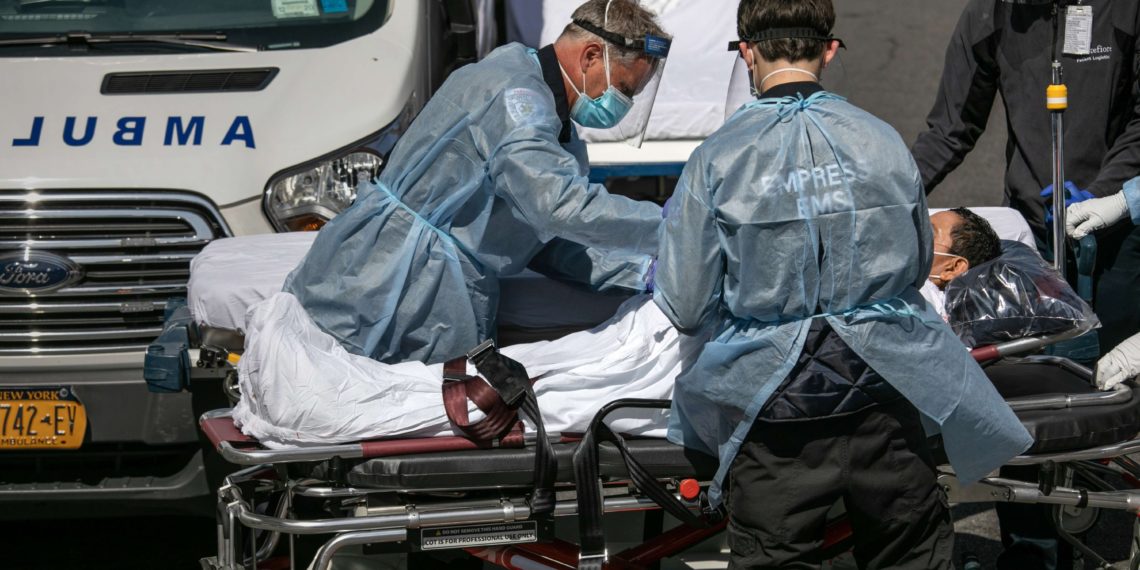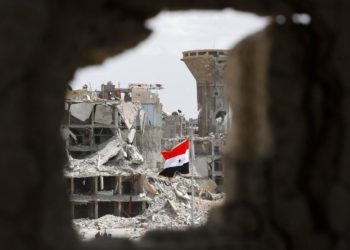“This emergency room is a warzone.” On March 30, a visibly anguished emergency room doctor in Brooklyn, New York, described her workspace as best she could in a televised interview on CNN.
She appeared in a bustling hospital room, not too far from a truck that was parked outside and loaded with ice to preserve human corpses. Behind this doctor, stretchers held countless unnamed patients, their faces blurred to ensure anonymity.
The equipment buzzed and beeped, nurses hopped across hallways, and florescent lights dulled everything to a blueish hue that matched the ominousness of a world impacted by the COVID-19 pandemic.
Fighting Coronavirus
During this pandemic, experts and media have articulated our relationship to COVID-19 through the metaphor of war. New York governor Andrew Cuomo deployed the metaphor freely, punctuating his message once with “We’re gonna kick COVID-19’s a**.”
President Donald Trump ended briefings with a phrase that likens the pandemic to a single, violent foe: “We’re gonna win.” Countless politicians have urged their local communities to “fight” the pandemic by staying home and washing hands.
The assumptions here indicate the country is at war, and the enemy is COVID-19. All citizens are potential casualties in this war, but medical professionals are the ones who are considered to be on the frontlines of battle, in the throes of danger.
Syrian Doctors on the Frontlines
As a medical anthropologist who since 2014 has conducted extensive research with Syrian doctors on the frontlines of the civil war in Syria, discourses linking medicine and conflict are not new to me.
The realities around COVID-19 in the United States – particularly the recent erection of field hospitals in parks, the frantic rationing of medical supplies, the need to improvise medicine on-the-spot, and the use of Tele-health to deliver care from afar – sound eerily familiar.
These realities, ostensibly so new to the United States, have been the norm in refugee camps and crisis zones throughout the Middle East since the Arab Spring took hold in 2011.
The trauma, fear, and frustration American healthcare workers are currently experiencing resemble the emotional burdens many Syrian doctors have carried for years now.
We are marshalling the full power of government and society to achieve victory over the virus. Together, we will endure, we will prevail, and we will WIN! #CARESAct pic.twitter.com/zb2PJTldGQ
— Donald J. Trump (@realDonaldTrump) March 27, 2020
We need to consider the circumstances that led each group of healthcare workers to this precarity. Each group has waged legitimate grievances against state and economic systems that have failed them. It is noteworthy that from the outset of COVID-19, some local and national figures were more concerned about protecting the market economy than saving lives, much less those lives of front-line care providers.
We can see in these situations the impossibility of medical neutrality, how politics and healthcare are mutually constitutive, and how western biomedicine is not a culture free practice decoupled from economics or the social world around us.
Obligation to Save Lives
Syrian doctors bring much to bear on how healthcare workers become situated on the “frontlines” of any national crisis without the safety and distance neutrality affords. More than any other aid group, they – and the hospitals they work in – have been the targets of state aerial bombardment precisely because of their life-saving potential.
Despite the risks work poses, they continue to provide care because, as numerous doctors have shared with me, they have a professional and national obligation to save lives.
Healthcare workers in the United States are currently in dire crisis, but Syrian and other Middle Eastern medical professionals have grappled with similar conditions throughout the years. Hundreds have lost their lives while providing care and others continue to amass a wealth of experiential knowledge about biomedicine that the world should, in this moment, find valuable.
‘We Can Help’
During a medical workshop in Orlando, Florida in 2017, I spoke with a young Syrian doctor named Majed. At the end of an extensive interview about his aid work in the war, I asked if he had any last thoughts to share. He paused and then spoke into my recorder in a strikingly authentic and earnest manner:
“I just want the world to know that we have knowledge and skills that others can use. We have a lot to offer the world, we have seen so much and we can help.”
Perhaps we are witnessing a moment in history when American doctors must lean on those in the Middle East for assistance, expertise, and commiseration, inverting what for decades has been a one-way street when it comes to global medical aid.
Disclaimer: The views and opinions expressed here are those of the author and do not necessarily reflect the editorial position of The Globe Post.






















